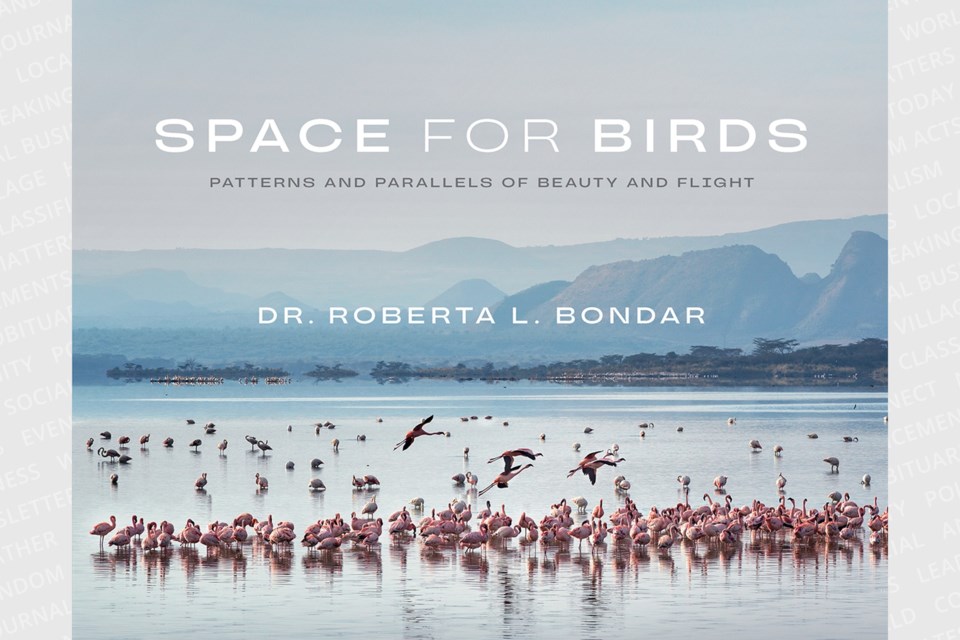Dr. Roberta Bondar, the world’s first neurologist in space and Canada’s first female astronaut, is releasing Space for Birds: Patterns and Parallels of Beauty and Flight in September.
The Sault Ste. Marie native's book explores the lives and habitats of two bird species — the endangered Whooping Crane and the near-threatened Lesser Flamingo. It is with her space, aerial, and surface photography that readers witness the fragility of the birds and the ecosystems they depend on.
The Whooping Crane is captured migrating from its boreal nesting grounds in Canada’s Wood Buffalo National Park to the seaside abundance of its winter habitat in Texas while the Flamingo is seen in flocks on and above East African Rift Valley lakes.
"Photos from the International Space Station convey the continental scale of these birds’ travels, and Bondar’s aerial and surface photos, accompanied by insights both scientific and personal, offer intimate glimpses of their daily lives and unique behaviours," said a news release. "While these birds lead different lives on opposite sides of the globe, they share, with each other and with us, an imperative to survive and a reliance on Earth’s fragile ecosystems."
Also from the news release:
- Breathtaking Photography: Dr. Bondar's images capture the birds in their natural habitats, from the East African Rift Valley to Canada's Wood Buffalo National Park.
- Unique Perspective: Drawing on her experience as an astronaut and professional nature photographer, Dr. Bondar offers a rare vantage point that blends scientific insight with artistic expression.
- Inspiring Narrative: The book emphasizes the importance of conservation, showcasing the interconnectedness of life on Earth and inspiring readers to appreciate and protect our natural world.
- Complementary Exhibit: The book is accompanied by a travelling photographic exhibit, "Patterns & Parallels: The Great Imperative to Survive," which will be showcased across North America over the next three years.
About the Author: Dr. Roberta L. Bondar is globally recognized for her pioneering contributions to space medicine, fine art photography, and environmental education. Her accolades include the NASA Space Medal, the Order of Canada, and induction into the Canadian Medical Hall of Fame. Dr. Bondar’s work is held in private, corporate, and institutional collections worldwide, and she is the author of several best-selling books.
Bondar is globally recognized for her pioneering contributions to space medicine research, fine art photography, and education on the environment. Aboard the Space Shuttle Discovery mission STS-42 in 1992, she conducted experiments in the first International Microgravity Laboratory, a precursor to the International Space Station. Trained by NASA’s Earth Observations team, she also photographed the Earth while circling it 129 times. Dr. Bondar later became an honors student in professional nature photography. For her Passionate Vision project, she photographed, with medium- and large-format film cameras, each of Canada’s national parks; for The Arid Edge of Earth she photographed global arid landscapes and their World Heritage Sites. Private, corporate, and institutional collections in Canada, the USA, and the UK hold Dr. Bondar’s fine art photographic prints. She is the author of several best-selling books featuring her writing and photography.
Dr. Bondar’s distinctions are diverse and include: Companion of the Order of Canada, the Order of Ontario, the NASA Space Medal, induction into the Canadian Medical Hall of Fame and into the International Women’s Forum’s Hall of Fame, many honorary doctorates from Canadian and American Universities, a former Chancellor of Trent University, six Canadian schools in her name, a Specially Elected Fellow of the Royal Society of Canada, an Honorary Fellow of the Royal Canadian Geographical Society, and her own star on Canada’s Walk of Fame.
Praise
“A fascinating and beautifully illustrated book that zooms in and out between an astronaut’s orbital perspective, aerial views of some unique and fragile environments, and intimate portraits of the elegant birds that live and breed there.”
— Dr. Kathryn Sullivan, scientist, astronaut, explorer, author
“Embark on a breathtaking photographic journey combining brilliant writing with awe-inspiring images as Dr. Bondar chronicles the mounting environmental challenges facing two struggling species.”
—Steve Perry, wildlife photographer, author, educator
“A gorgeous photo essay by Roberta Bondar, first female Canadian astronaut: two migratory birds, Whooping Crane and Lesser Flamingo, and what their necessary habitats look like. In one word, stunning!”
—Margaret Atwood, writer, (via Twitter)
